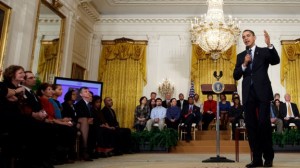
President Obama: "We need to preserve a U.S. auto industry. I think that's important."
The signals have been getting clearer for weeks now that some sort of taxpayer assistance will continue to be extended to the ailing auto industry. Whether you look at statements coming from U.S. Treasury officials on the Auto Task Force or Senator Carl Levin of Michigan saying aid is on the way, or the $5 billion of credit now available to auto suppliers — it’s obvious that the government will not pull the plug on Chrysler and General Motors.
Now the man who will make the critical decision about whether another $22 billion in loans should be granted to Chrysler and General Motors or the existing $ $17.4 billion in loans called, forcing them into bankruptcy, has spoken out.
President Obama yesterday afternoon said, “We need to preserve a U.S. auto industry. I think that’s important. I think it’s important not just symbolically; it’s important because the auto industry is a huge employer — not just the people who work for GM or Ford or Chrysler, but all the suppliers, all the ripple effects that are created as a consequence of our auto industry.”
The President was speaking during his first online town hall meeting, the 21st century equivalent of the fireside radio chats that another Democratic president, who also inherited a Republican economic disaster, used to sell his badly needed programs.
While the President was clear in intent, details were lacking.
“I’m not going to be as specific as you’d like, but I guarantee in the next few days you will have a very extensive answer on what we need to do,” he said in response to a question about the fate of the companies.
And he also paved the way for more pain in an industry that has seen much already:
“I think it is appropriate for us to say, are there ways that we can provide help for the U.S. auto industry to get through this very difficult time — but the price is that you’ve got to finally restructure to deal with these long-standing problems. And that means that everybody is going to have to give a little bit — shareholders, workers, creditors, suppliers, dealers — everybody is going to have to recognize that the current model, economic model, of the U.S. auto industry is unsustainable. Even if sales go back to 14 million, which eventually they will, it’s still a model that doesn’t work. Just trying to build more and more SUVs and counting on gas prices being low and that’s your only profit margin, that’s just not a model that’s going to work.”
So now we and the millions of workers involved in the industry wait. What’s not clear is what form this aid will take.
It’s also not clear what the restructuring plans of Chrysler and GM will look like once the vetting or shaping by Treasury officials is over. This task was supposed to be done by March 31st, but the sheer size of the plans and the recalcitrance of bondholders to take 30 cents on the dollar in a debt-for-equity swap have officials admitting more time is needed. This is very much a work still in progress and the details are likely to take months, if not years to work out.
Another wild card in this high-stakes poker game is an EPA ruling on the regulation of greenhouse gases and future fuel economy standards. The administration has signaled that it is sympathetic to the demands of environmentalists and California’s attempt to go it’s own way. It’s due any moment now, and it could drastically alter the vehicles you can drive in future years.
Look for more details to emerge later today and on the Sunday morning political chat shows — leading up to a Monday announcement by the President. He needs to have something in place before he leaves for Europe and the G20 meeting on Tuesday.
“So what we’re expecting is that the automakers are going to be working with us to restructure. We will provide them some help. I know that it is not popular to provide help to autoworkers — or to auto companies. But my job is to measure the costs of allowing these auto companies just to collapse versus us figuring out, can they come up with a viable plan? If they’re not willing to make the changes and the restructurings that are necessary, then I’m not willing to have taxpayer money chase after bad money,” the president concluded.
